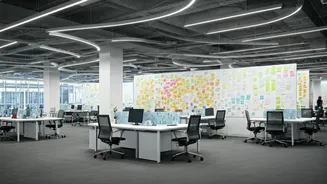In-Person Presence Matters
Jamie Dimon, the head of JPMorgan, has strong opinions about the benefits of working in an office setting. He believes that being physically present in the workplace
is vital for certain types of learning and professional development. According to him, casual interactions and spontaneous moments of collaboration that happen naturally when people are together in an office are key to fostering innovation and building relationships. These unplanned encounters can lead to new ideas and a stronger sense of teamwork, something that remote work struggles to replicate. The ability to quickly discuss projects, brainstorm, and get immediate feedback is much easier when everyone is in the same location. Dimon's view underscores the idea that offices are not just places to work but also centers for learning and relationship-building.
Mentorship and Guidance
Another key area highlighted by Dimon is the importance of mentorship and guidance, which he believes can be compromised in remote work setups. In a traditional office environment, it's easier for senior employees to mentor and guide junior team members. They can observe their work, provide direct feedback, and share their expertise in real-time. This kind of hands-on learning helps newcomers develop skills and understand company culture quickly. In contrast, remote work can make these mentoring interactions more formal and less frequent. The spontaneous conversations, the ability to witness how experienced professionals handle challenges, and the chance to learn from others’ mistakes are reduced. Therefore, Dimon suggests that maintaining a strong mentoring culture requires deliberate effort and careful planning in remote settings to ensure that the learning process remains robust.
Culture and Connection
Dimon emphasizes that building a strong company culture is another area where in-office work has a significant advantage. A company's culture is formed by shared experiences, norms, and the way people interact with each other. In a physical office, employees get to experience this culture through day-to-day interactions. Social events, team lunches, and even informal chats in the break room contribute to a shared sense of belonging and camaraderie. These social interactions help build trust, improve communication, and reinforce the values and goals of the organization. Remote work, on the other hand, can make it harder to build and maintain these connections. Without the same level of physical presence and interaction, employees may feel more isolated, and the company culture can weaken. Dimon argues that maintaining a strong culture requires strategic efforts, which could include more virtual social events or initiatives to promote regular team interactions in remote work environments.

















